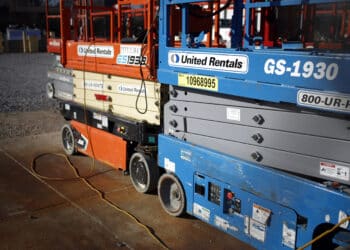United Kingdom-based fleet manager Ryder System’s rental revenue slid 4.54% year over year in the first quarter of 2024, pushing the company’s bottom line downward.
Ryder System noted in today’s earnings report that its overall operating revenue in Q1reflected a decline in commercial rental revenue, which totaled $936 million for the quarter, down from $979 million in Q1 2023.
Ryder System Chief Executive Robert Sanchez said during today’s Q1 earnings call that he foresees the rental market to continue its downturn in 2024, describing it as “a year that we expect will represent trough conditions in used-vehicle sales and rental.”
Rental revenue down
In its Q4 2023 earnings report in February, Ryder reported full-year rental revenue was down 12% YoY to $1.2 billion. Ryder noted in its earnings report for the third consecutive quarter that it continues to combat “weaker freight conditions,” which are decreasing the need for rentals.
As a result, Ryder invested 76% less in its rental business in Q1 2024 than it did in Q1 2023: $79 million compared with $177 million, per earnings reports.
“The earnings decline reflects weaker market conditions in used-vehicle sales and rental, partially offset by higher supply chain and choice lease results,” Ryder Chief Financial Officer John Diez said during the earnings call. “Rental results for the quarter reflect market conditions that remain weak, in addition to the sequential decline in rental activity we typically see in the first quarter.”
Fleet management solutions’ operating revenue was also affected by lower rental demand. Ryder reported revenue for the segment was down 1% in the quarter.
Utilization dips, prompting sales
Rental utilization of Ryder’s power fleet was 66% in Q1, down from 75% the prior year.
As a result, Ryder will continue to engage in “de-fleeting,” or preparing its fleet vehicles for sale or auction. It sold 6,500 used vehicles in Q1, up from 5,100 in Q1 2023.
“Our sales volumes and inventory levels reflect higher lease replacement and rental de-fleeting activity,” Diez said. Used-vehicle inventory in Q1 was 8,900 vehicles, up from 8,000 Q4.
Diez added that while used-vehicle sales are dropping, Ryder expects proceeds to “remain above residential value estimate fees for depreciation purposes.” Ryder expects to net approximately $600 million on used-vehicle sales this year, down $200 million from 2023, Diez said.
Used truck profits decline
Used-tractor proceeds were down 34% YoY in Q1, while used-truck proceeds declined 30% YoY.
“As anticipated, market conditions for used-vehicle sales continue to weaken from elevated levels in the prior year,” Diez said on the call. Ryder’s capital expenditures on leasing in Q1 were $582 million, up from $579 million in Q1 2023.
The company attributed the increase to investing more in the trucking market and said that at the end of 2023, trucks made up 60% of its rental fleet, compared with 49% in 2018, the company said.
“Trucks have benefited from relatively stable demand and pricing trends,” Diez said.
Ryder might be investing in trucking without any immediate return.
“It’s the longest downturn we’ve had in a long time,” Sanchez said on the call. “So, we should be getting closer to the end of this.
“Obviously, demand hasn’t come back the way we’d like, but there is an oversupply of rental trucks in the market right now, that I think the industry has done a pretty good job over time to right-size these fleets, but this one may take a little bit longer.”
Register for the 2024 Equipment Finance Connect, which focuses on best practices in equipment finance, on May 5-7 in Nashville, Tenn. Learn about the event and free dealer registration at EquipmentFinanceConnect.com.









